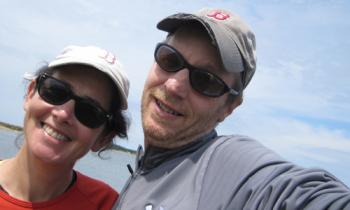Pat & Barbara Woodbury

Cape Cod Shellfish Industry Interviews
This is a collection of 15 interviews conducted in 2007 with people on Cape Cod who are involved in the shellfishing industry. Five people who are employed by towns to manage and regulate shellfish (Shellfish Officers), seven people who own shellfish aquaculture businesses (Growers), and four people who harvest wild shellfish commercially (Commercial Harvesters) were asked the question “What does shellfishing mean to you?”. From that starting point, questions centered on how the individual got into shellfishing and then what they thought the future of shellfishing might be.
The interviews were conducted by Sandy Macfarlane, a retired shellfish biologist and conservation administrator for the town of Orleans. The work was done under a contract with the Barnstable County Cooperative Extension Marine Program. Each interview is summarized into a written document that varies from 807 to 1557 words long and has an accompanying photograph. The interviews represent geographic, age, gender, and experience diversity as well as shellfish species diversity. All interviewees are year round residents of Cape Cod. One theme that emerged from this work is that shellfishing remains an important component of the Cape Cod economy and culture and those who are involved are concerned about its continued presence.
In 2007, Pat and Barbara Woodbury were shellfish growers in the town of Wellfleet, who are deeply embedded in the shellfishing industry of Cape Cod. As shellfish growers, they have dedicated themselves to the cultivation and harvesting of shellfish, a practice that not only supports their livelihood but also contributes significantly to the local economy and cultural fabric of the region. The Woodburys are known for their commitment to sustainable aquaculture and for imparting the values of self-reliance and environmental stewardship to their children through their hands-on approach to shellfishing.
Scope and Content Note
The interview with Barbara and Pat Woodbury provides an insightful look into the life and work of shellfish growers on Cape Cod. They discuss moving to Wellfleet, being independent, their early career goals and how they got involved in aquaculture, raising their family, gear, techniques, their relationship with their crew, markets, lifestyle, and the importance of good water quality. The Woodburys talk about the integral role that shellfishing plays in the local economy and its significance to the cultural heritage of the area. They share personal anecdotes that illustrate the fulfillment they derive from nurturing shellfish from seed to a consumable food product. The couple emphasizes the sustainable and environmentally friendly practices inherent in shellfish aquaculture, underscoring the green aspects of their work. Additionally, they candidly address the various challenges they face in operating a small-scale shellfishing business, as well as the rewards that come with such an endeavor. Their narrative sheds light on the complexities of shellfishing as an industry and as a way of life, providing a valuable perspective on the balance between economic activity and ecological responsibility.
Please Note: The oral histories in this collection are protected by copyright and have been created for educational, research and personal use as described by the Fair Use Doctrine in the U.S. Copyright law. Please reach out Voices@noaa.gov to let us know how these interviews are being used in your research, project, exhibit, etc. The Voices staff can help provide other useful resources related to your inquiry.
The NOAA mission is to understand and predict changes in climate, weather, oceans, and coasts, to share that knowledge and information with others, and to conserve and manage coastal and marine ecosystems and resources. The Voices Oral History Archives offers public access to a wide range of accounts, including historical materials that are products of their particular times, and may contain offensive language or negative stereotypes.
Voices Oral History Archives does not verify the accuracy of materials submitted to us. The opinions expressed in the interviews are those of the interviewee only. The interviews here have been made available to the public only after the interviewer has confirmed that they have obtained consent.
